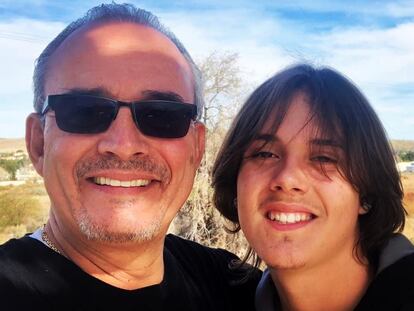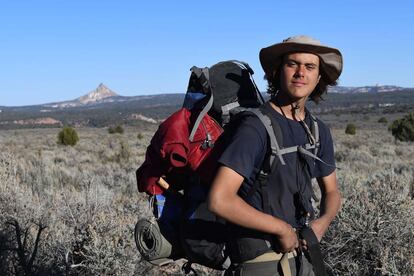‘My son was everything to me and he’s gone:’ How social media is used to sell fentanyl in the US
The president of Victims of Illicit Drugs, Jaime Puerta, recalls the loss of his only child after the latter contacted a dealer on Snapchat

Jaime Puerta, a native of Colombia who is now a U.S. citizen, remains silent for a few moments, then takes a deep breath before talking about his son, José Daniel. “He had a lot of friends, he was a very sensitive person and he had a big heart [...] He was my only son, he was everything to me, he was absolutely everything to me,” he says, speaking by telephone from his home in California.
It has been three years since the 16-year-old bought an oxycodone pill (an opioid drug) through the online platform Snapchat. The apparently ordinary pill contained a lethal amount of fentanyl, a drug 50 times more potent than heroin and which has plunged the United States into a public health crisis.
In early May, the U.S. Drug Enforcement Administration (DEA) concluded Operation Last Mile, which targeted “the trafficking of fentanyl and methamphetamine within the United States driven by the Sinaloa and Jalisco Cartels.” The operation resulted in 3,337 arrests, the seizure of nearly 44 million fentanyl pills, more than 6,500 pounds of fentanyl powder, more than 91,000 pounds of methamphetamine, 8,497 firearms and more than $100 million. In a press release, the U.S. agency gave an account of the danger that this distribution poses to the country and pointed to the two Mexican cartels as being behind it. It also noted that the cartels and their associates use social media apps to reach out to victims.
Tens of thousands of Americans have died from fentanyl use. Some time after the death of José Daniel, Puerta founded VOID (Victims of Illicit Drugs), an organization that issues warnings, offers tools and proposes legislation to fight the drug scourge. Puerta underscores that this type of substance proves wrong the belief that only addicts take drugs. He insists that young people are victims of it, too. “The mental health of our young people has deteriorated at an alarming rate. They do not have the tools to know how to deal with a stressful problem or with a psychological, emotional or physical trauma.”

The presence of distributors on social media, combined with young people’s use of platforms with legal loopholes, can prove lethal on occasion, notes Puerta. “They are home alone, with their phones, stressed out because of an exam or whatever. They go on social media, and they do what their friends have done in the past,” he says, noting the importance of young people’s desire to identify with a group.
His son had been diagnosed with hyperactivity and depression. Puerta describes him as a “very intelligent” boy who was especially good at math. “We think that the confinement due to Covid-19 upset him, and he got in touch through Snapchat with a micro-dealer who gave him a pill about three blocks from my house. He brought it here [to his home in California] on March 31. I found him unconscious on April 1; his lips and nails were blue,” Puerta recalls in a slow voice.
His organization, VOID, has brought the documentary Dead on Arrival to several U.S. schools and centers. In it, members of the association recount the tragic loss of one of their relatives. The documentary provides examples to show the danger of synthetic drugs, comparing the amounts that can be lethal. The images show a negligible amount of fentanyl. Steve Filson, secretary of the organization, explains: “This dose of fentanyl would kill you and me if we shared it out. They put fentanyl in the cocaine, in the heroin, in the counterfeit pills. It’s odorless, tasteless, you don’t know it’s there, and when you find out it’s too late.”
In recent months, fentanyl has reignited the friction between the governments of the United States and Mexico over drug trafficking. The radical wing of the Republican Party has tried to make synthetic drugs the focus of its agenda ahead of the 2024 elections. The governor of Florida, Ron DeSantis, said last year that “you have people coming across illegally from countries all over the world. And so what has that gotten us? We now, in this country, have the leading cause of death for people 18 to 45 as fentanyl overdose.”
Mexican President Andrés Manuel López Obrador was quick to respond to the harsh criticism and sought to shift the focus to China. The Mexican president has reiterated on several occasions that the Asian country is the axis of the global traffic in the synthetic substance. At the beginning of May, a container with 600 packages of drugs intercepted in the port of Lázaro Cárdenas led him to insist that it is not Mexico that produces fentanyl: “We already have proof.” In his morning conference, the president announced that he would send a new letter to request the cooperation of the Xi Jinping government.
Puerta says that the solution to this drug trafficking is “very complex.” “Both countries are to blame for this scourge [...] The solution would entail solving our children’s mental health problems on this side [in the U.S.] and [limiting] the social networks where these drugs are being distributed,” he explains. Puerta also considers that the position of the Mexican president should involve treating the issue as a Mexican problem, an idea reinforced in recent months with statements by the Mexican Undersecretary of Health, Hugo López-Gatell, who pointed to the existence of fentanyl routes from “the United States to Mexico.”
The president of VOID held a protest outside the headquarters of Snapchat, in California, just three days after the DEA released its conclusions on Operation Last Mile. Over the phone, Puerta continues to remember José Daniel. “I never got to see him graduate from college. I will never be a grandfather. His friends are still upset by his death.”
Sign up for our weekly newsletter to get more English-language news coverage from EL PAÍS USA Edition
Tu suscripción se está usando en otro dispositivo
¿Quieres añadir otro usuario a tu suscripción?
Si continúas leyendo en este dispositivo, no se podrá leer en el otro.
FlechaTu suscripción se está usando en otro dispositivo y solo puedes acceder a EL PAÍS desde un dispositivo a la vez.
Si quieres compartir tu cuenta, cambia tu suscripción a la modalidad Premium, así podrás añadir otro usuario. Cada uno accederá con su propia cuenta de email, lo que os permitirá personalizar vuestra experiencia en EL PAÍS.
¿Tienes una suscripción de empresa? Accede aquí para contratar más cuentas.
En el caso de no saber quién está usando tu cuenta, te recomendamos cambiar tu contraseña aquí.
Si decides continuar compartiendo tu cuenta, este mensaje se mostrará en tu dispositivo y en el de la otra persona que está usando tu cuenta de forma indefinida, afectando a tu experiencia de lectura. Puedes consultar aquí los términos y condiciones de la suscripción digital.









































